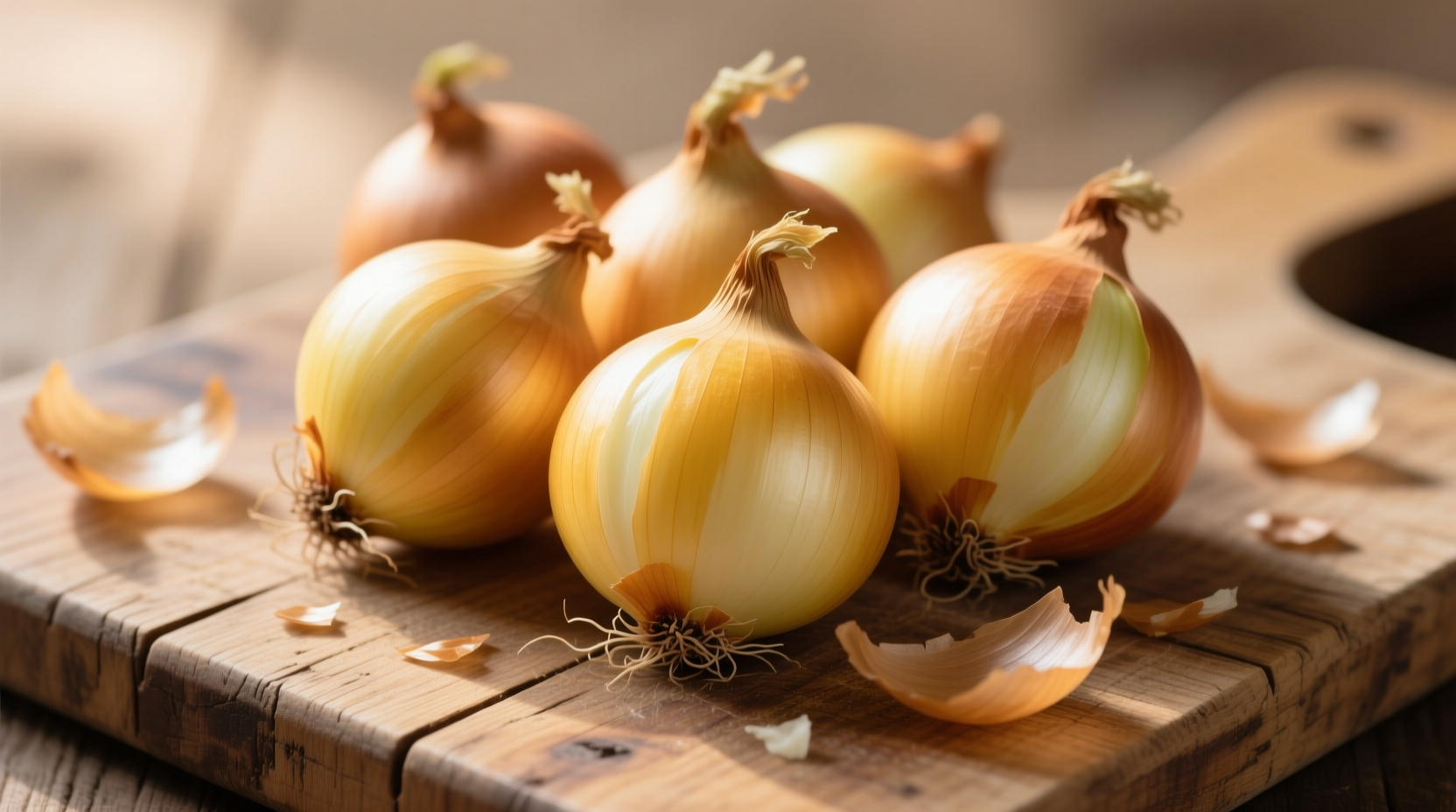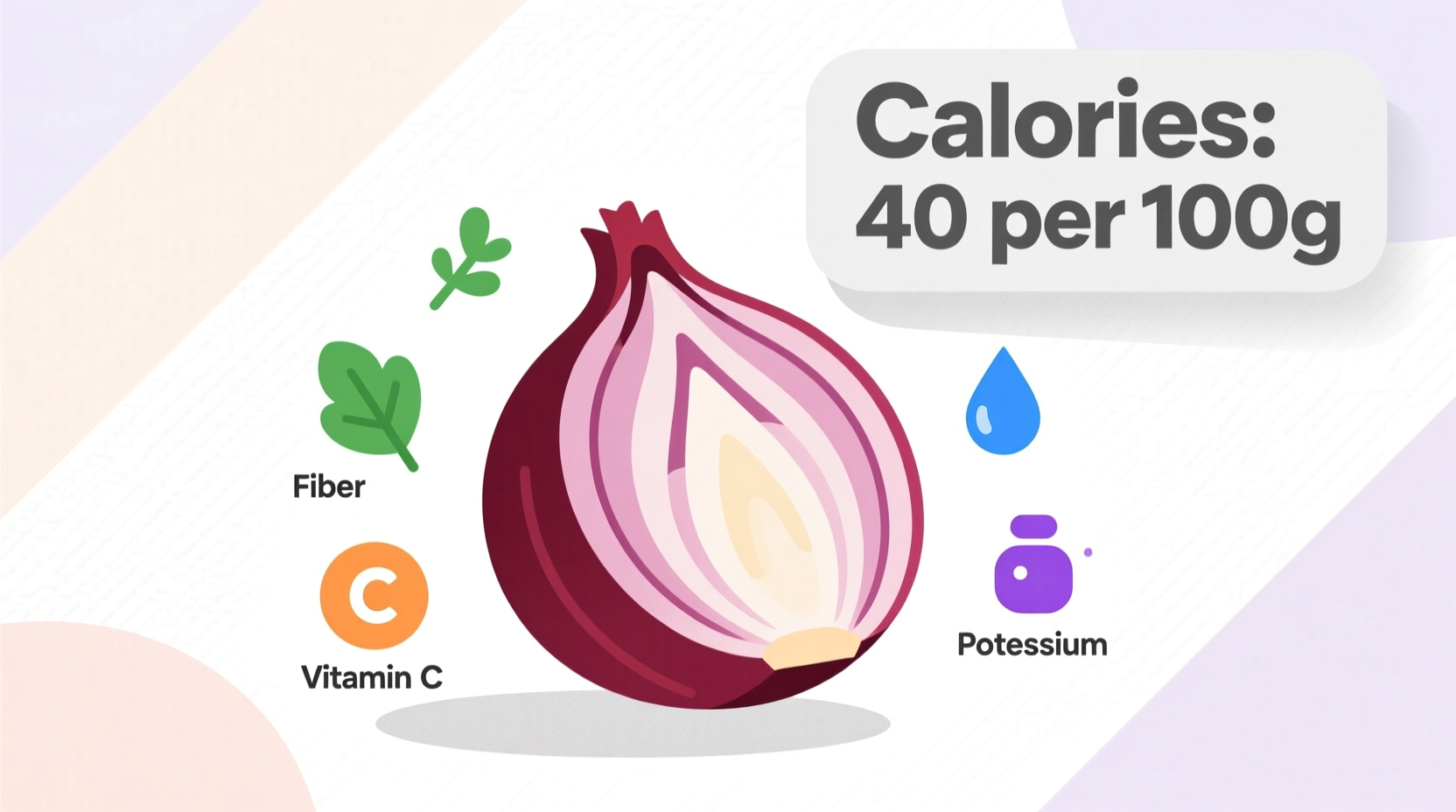Onions are a kitchen staple that adds flavor without significantly impacting your daily calorie count. Whether you're tracking macros, managing weight, or simply curious about nutrition, understanding the precise caloric content of onions helps make informed dietary choices. This guide delivers scientifically verified information about onion calories across varieties and preparation methods.
What You Need to Know About Onion Calories
When incorporating onions into your meals, knowing exactly what you're adding to your plate matters. Onions rank among the lowest-calorie vegetables available, making them an excellent choice for flavor enhancement without substantial caloric impact. The United States Department of Agriculture's FoodData Central database confirms that raw yellow onions contain just 40 calories per 100 grams.
For practical meal planning, consider these common serving sizes:
- One medium onion (110g): 44 calories
- One cup chopped (160g): 64 calories
- One tablespoon raw (16g): 6 calories
Comparing Onion Varieties: Calorie Differences
While most onion varieties share similar nutritional profiles, slight variations exist between types. The table below shows calorie content across common onion varieties based on USDA verified data:
| Onion Type | Calories per 100g | Primary Nutritional Difference |
|---|---|---|
| Yellow Onion | 40 | Standard variety, slightly higher sulfur compounds |
| Red Onion | 42 | Contains anthocyanins (antioxidants) |
| White Onion | 43 | Milder flavor, slightly higher water content |
| Green Onions | 32 | Lower calorie count, different nutrient profile |
| Shallots | 72 | Higher carbohydrate concentration |
How Cooking Methods Affect Onion Calories
Preparation techniques significantly impact the final calorie density of onions. While onions themselves don't gain calories when cooked, water loss concentrates existing nutrients and carbohydrates:
- Raw: Maximum water content (89%), lowest calorie density
- Sautéed: Water evaporates, concentrating calories (60 calories per 100g cooked)
- Caramelized: Natural sugars concentrate further (90 calories per 100g)
- Fried: Absorbs cooking oil, dramatically increasing calories (150+ calories per 100g)
When tracking calories for weight management, remember that caramelized onions contain nearly double the calories of raw onions by weight due to water loss during cooking.

Nutritional Context: Beyond Just Calories
Onions offer valuable nutrients beyond their low-calorie profile. A medium onion provides:
- 12% of your daily vitamin C needs
- Significant quercetin (a powerful antioxidant)
- 3 grams of dietary fiber (12% of daily value)
- Negligible fat content (0.1g per 100g)
- Minimal protein (1.1g per 100g)
The USDA Agricultural Research Service confirms that onions' primary carbohydrate content comes from natural sugars (4.2g per 100g) and dietary fiber, making them suitable for most dietary approaches including low-carb plans when consumed in reasonable portions.
Practical Applications for Your Diet
Understanding onion calories helps optimize your meal planning:
- Weight Management: Use raw onions generously as they add volume and flavor with minimal calories
- Meal Prep: Account for calorie concentration when onions are cooked down in sauces or stews
- Dietary Tracking: Weigh onions before cooking for accurate calorie counting
- Flavor Enhancement: Replace higher-calorie flavorings with onions to reduce overall meal calories
Nutrition professionals at the Harvard T.H. Chan School of Public Health recommend incorporating onions regularly due to their nutrient density and versatility across dietary patterns. Their low calorie count combined with valuable phytonutrients makes them an excellent choice for health-conscious eating.
Common Misconceptions About Onion Calories
Several myths persist about onion nutrition that deserve clarification:
- Myth: All onions have identical nutritional profiles
Fact: While similar, red onions contain additional antioxidants not found in yellow varieties - Myth: Cooking destroys all nutritional value
Fact: Some nutrients become more bioavailable when cooked, though vitamin C decreases - Myth: Onions spike blood sugar significantly
Fact: With a glycemic load of just 1-2, onions have minimal impact on blood glucose
Putting Onion Calories in Perspective
Compared to other common flavor enhancers, onions offer exceptional value:
- 1 tablespoon butter: 102 calories vs. 1/4 cup onions: 16 calories
- 1/4 cup sour cream: 113 calories vs. same volume onions: 43 calories
- 1/4 cup cheese: 110 calories vs. same volume onions: 43 calories
This comparison demonstrates why professional chefs and nutritionists recommend using onions as a flavor foundation to reduce overall meal calories while maintaining taste satisfaction.
Final Thoughts on Onion Nutrition
Onions represent one of the most nutritionally efficient flavor builders available. With approximately 40 calories per 100 grams in their raw form, they deliver substantial flavor and nutritional benefits with minimal caloric impact. Whether you're following a specific dietary plan or simply aiming to eat more mindfully, incorporating onions can enhance your meals without compromising your nutritional goals. Remember to account for water loss during cooking when tracking precise calorie intake, and enjoy this versatile vegetable as part of a balanced eating pattern.











 浙公网安备
33010002000092号
浙公网安备
33010002000092号 浙B2-20120091-4
浙B2-20120091-4